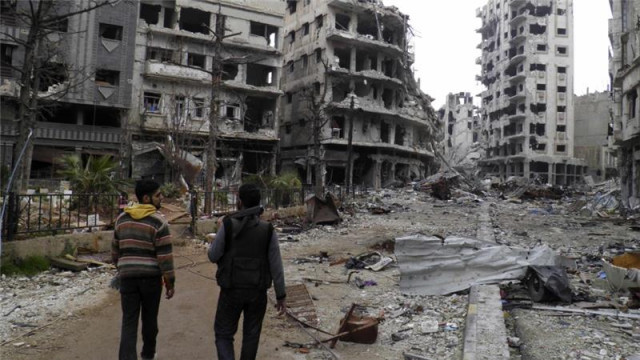REPLUG: Syrian crisis and World War III
It won’t be wise to ignore warnings that point towards a war on a global scale

The last time there was a world war, more than 60 million people died over the course of six years. PHOTO: REUTERS
Obama says not confident Putin can be trusted to cooperate in Syria
Here’s what you need to know to understand the Syrian crisis and why it can act as a springboard for a global war:
1) It all started in 2011 when Syrian President Bashar al-Assad tried to violently repress anti-government protests as part of the Arab Spring.
2) Now a full-scale insurgency, the Syrian conflict is a complex combination of civil, sectarian and proxy battles. These overlapping conflicts are fought by different regional groups and are backed by various global players making it an international fight:
- It is a civil war because a part of the population wants to overthrow the Assad-led government. They are generally called the rebels. Assad is supported by Russia and Iran, while the rebels are backed by USA, Turkey and Gulf states. There are also the Kurdish groups in northeastern Syria which want autonomy from the country.
- It is a sectarian war because the rebels are Sunnis and Assad’s government is Shia. This religious dimension brings regional sectarian groups, such as Hezbollah and ISIS, into the equation.
- It is a proxy war because Gulf States are basically fighting Iran and USA is fighting Russia via Syria.
France condemns Aleppo hospital bombing, calls attacks war crimes
- Assad is fighting because he wants to continue ruling Syria.
- The rebels are fighting because they want to overthrow Assad and grab power.
- Hezbollah is part of the conflict because it is supporting Assad for sectarian reasons.
- ISIS is part of the conflict because it wants to control Syrian territory and expand as part of its caliphate.
- Iran is involved because it wants a Shia-controlled Syria.
- Gulf States are involved because they want Sunni-controlled Syria.
- Russia is involved because it has good ties with the Assad family, supplies massive amounts of weapons in military contracts to Syria, has a key naval facility in the country, wants to limit American influence in the region and sees Assad’s Shia regime as an opposition to growing Sunni militancy.
- Turkey is involved because it wants to keep Syrian Kurds in check as it sees them as an extension of its own Kurdish population which has been demanding autonomy for decades.
- USA is involved because it believes Assad has committed atrocities and must step down (in support of Saudi demands), to end Syria-Iran nexus and to control ISIS.
4) While these are the main foreign players, so many other countries are also involved in the conflict in one way or another:
- Algeria: The country has been opposing disciplinary measures against the Syrian government.
- Belarus: In support of Moscow, the country offered air strikes in Syria.
- China: This year, senior military officials announced their intention to provide personnel training and humanitarian aid to Assad’s government. China has long upheld the principle of non-interference in the internal affairs of sovereign countries and views Assad’s regime as legitimate.
- France: As it opposes Assad and mistrusts Iran, it has been supporting anti-government forces. Many believe the intervention is an attempt to reinforce itself as a great power.
UN chief appalled by ‘chilling’ attacks on Syria’s Aleppo
- Iraq: ISIS has taken over parts of the country bordering Syria.
- North Korea: Militia units from the country are believed to be present in Syria in support of Assad.
- Lebanon, Jordan and Europe: Millions of refugees have taken refuge in these countries, making them a vital party to this conflict.
- UK: The country has been involved in bombing raids against ISIS in Syria.
- Venezuela: Hugo Chavez supported Assad and had supplied diesel to fuel military tanks. The country also announced to take 20,000 refugees.
With this level of foreign entanglement for more than five years now, it won’t be wise to ignore warnings that point towards a war on a global scale.



















COMMENTS
Comments are moderated and generally will be posted if they are on-topic and not abusive.
For more information, please see our Comments FAQ